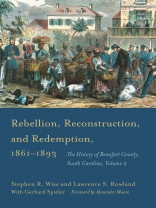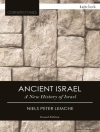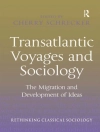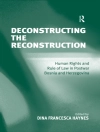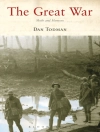The continued history of Beaufort County, South Carolina, during and following the Civil War
In Rebellion, Reconstruction, and Redemption, 1861-1893, the second of three volumes on the history of Beaufort County, Stephen R. Wise and Lawrence S. Rowland offer details about the district from 1861 to 1893, which influenced the development of the South Carolina and the nation. During a span of thirty years the region was transformed by the crucible of war from a wealthy, slave-based white oligarchy to a county where former slaves dominated a new, radically democratic political economy.
This volume begins where volume I concluded, the November 1861 Union capture and occupation of the Sea Islands clustered around Port Royal Sound, and the Confederate retreat and re-entrenchment on Beaufort District’s mainland, where they fended off federal attacks for three and a half years and vainly attempted to maintain their pre-war life. In addition to chronicling numerous military actions that revolutionized warfare, Wise and Rowland offer an original, sophisticated study of the famous Port Royal Experiment in which United States military officers, government officials, civilian northerners, African American soldiers, and liberated slaves transformed the Union-occupied corner of the Palmetto State into a laboratory for liberty and a working model of the post-Civil War New South.
The revolution wrought by Union victory and the political and social Reconstruction of South Carolina was followed by a counterrevolution called Redemption, the organized campaign of Southern whites, defeated in the war, to regain supremacy over African Americans. While former slave-owning, anti-black ‚Redeemers‘ took control of mainland Beaufort County, they were thwarted on the Sea Islands, where African Americans retained power and kept reaction at bay. By 1893, elements of both the New and Old South coexisted uneasily side by side as the old Beaufort District was divided into Beaufort and Hampton counties. The Democratic mainland reverted to an agricultural-based economy while the Republican Sea Islands and the town of Beaufort underwent an economic boom based on the phosphate mining industry and the new commercial port in the lowcountry town of Port Royal.
Über den Autor
Stephen R. Wise is the director of the Parris Island Museum, and the cultural resource manager for the Marine Corps Recruit Depot, and he serves on the editorial board for the South Carolina Historical Magazine. He is the author of two books published by the University of South Carolina Press—Lifeline of the Confederacy: Blockade Running during the Civil War and Gate of Hell: The Campaign for Charleston Harbor 1863, named by the South Carolina Historical Society as the best book written on South Carolina History in 1994. Wise lives in Beaufort with his wife, Alice Parsons Wise.
